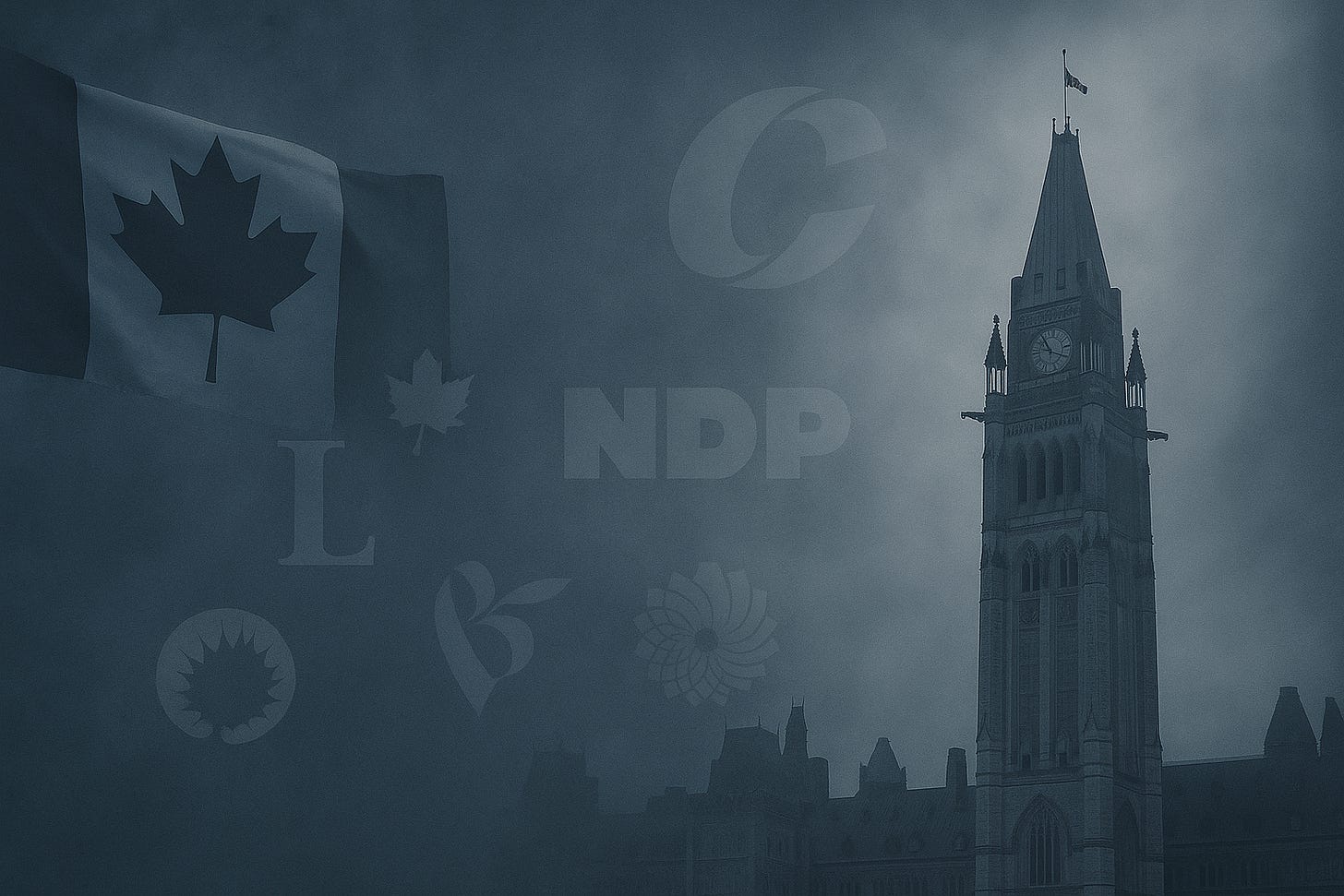Canada's Privacy Blind Spot: The Political Exemption No One Talks About
The Conservative Party's data practices expose a glaring exemption in Canada's privacy laws—and you're the product.
If a marketing agency wrote the Conservative Party of Canada’s privacy policy, it would be fired for overreach. Wide data capture, indefinite retention, public enrichment—all radioactive in the commercial world. For political parties, it’s just another Tuesday.
As someone who’s worked in marketing technology, what jumps out isn’t the political content (that has its expected polished graphic design elements)—it’s the infrastructure that must be involved.
Only after reading the CPC’s privacy policy does it become clear that it’s less a legal disclaimer than a manual for audience engineering — packed with terms like “public source enrichment” and “customized supporter experiences.”
To most Canadians, that might sound like benign outreach. But to anyone who has spent time in MarTech, it sounds like a high-volume profiling operation running with fewer rules than a Shopify storefront.1
What It Actually Allows
Voter intelligence at household scale.
The CPC policy explicitly includes personal data about family members. In MarTech terms, that’s householding: linking profiles by address to predict shared behaviour and optimize messaging.2
In practice: if you sign a petition, they can infer your spouse’s voting intention based on neighbourhood data and demographic modeling, without ever contacting those individuals directly.
Behavioural targeting with political intent.
The phrase “customizing supporter experience” is corporate-speak for micro-targeting. Combined with donation and volunteer data, that means behavioural prediction models: who will donate, who will vote, who might defect. A donor who gives $50 twice gets volunteer recruitment emails. A $200 donor gets leadership race pitches and VIP event invites. Each interaction refines the model.
Public-source enrichment.
“Publicly available sources” means anything from LinkedIn to real estate databases. That’s lead scoring 2.0 and without needing consent3. Your home value, professional designation, and social media activity become data points in a profiling system you never agreed to join.
Unlimited retention and redeployment.
The CPC provides unsubscribe links for emails and calls—but not for profiling. Nothing stops indefinite data retention, merging historical data with new sources to sharpen precision4. Your 2015 petition signature can be combined with your 2023 postal code change to predict your 2025 vote.
Third-party tracking baked in.
CPC’s site uses analytics and advertising cookies, including third-party pixels. That’s the connective tissue between first-party voter databases and external ad platforms like Google, Meta, Mailchimp, and others5. Every page view feeds the algorithm that builds a representative persona and later helps to model entire audiences.
Cross-organization sharing.
Data moves freely within the Party: HQ, riding associations, candidates, and leadership contestants. In CRM terms, that’s a federated database architecture with thousands of users and no stated audit control6. Your local candidate’s volunteer coordinator potentially has access to the same national profile as Party headquarters.
A Note on Partisanship
To be clear: the Liberals and NDP operate under the same exemption and engage in similar practices. But the CPC has built the most sophisticated infrastructure and been the most transparent about it—ironically, their detailed privacy policy is what makes this analysis possible. The Conservatives didn’t create this loophole; they’ve just optimized it better than anyone else.
The problem isn’t partisan; it’s systemic.
The Hidden Loophole in the “No Sale” Clause
One line in the CPC policy stands out: “We will not sell your personal information that you have chosen to provide to us.” To a privacy lawyer, it sounds narrow. To a MarTech person, it sounds like a signal—that there’s another dataset somewhere else.
Here’s what this phrasing means in practice:
Two data categories. There’s directly submitted data (forms, petitions, donations, volunteer sign-ups) stored in their main CRM, and indirectly acquired or enriched data—from voter rolls, public sources, or third-party vendors—that’s linked to your record but not technically “provided by you.”
Different rules for each. The CPC could delete or suppress your submitted data while keeping a shadow record populated through enrichment. They can claim they’ve purged “your data,” even as your name persists in another system.
External enrichment layer. This wording implies an external data ecosystem—a set of append systems or analytics platforms that the Party doesn’t “own” but actively uses to augment supporter profiles. Think of it as a hybrid environment: a primary CRM (likely NationBuilder, Salesforce, or custom) feeding into an enrichment and analytics layer powered by vendors and cookies.
A deliberate firewall. In commercial settings, this separation would breach PIPEDA or GDPR because consent must follow the data. But since those laws don’t apply to federal parties, this language acts as a legal firewall—shielding the Party from accountability for data they still benefit from7.
In short, the CPC can plausibly claim compliance with its own policy while continuing to operate an integrated data ecosystem that links enriched, indirectly obtained, and campaign-generated data together. It’s not transparency—it’s compartmentalized responsibility.
…That Time When the Conservative Party’s Database Vanished
In 2013, the Conservative Party lost access to its entire voter database, a system known internally as CIMS (Constituent Information Management System). According to party insiders who spoke on condition of anonymity, the event was described as a catastrophic system failure that temporarily erased years of voter history, supporter data, and riding-level analytics. The circumstances—accident, internal sabotage, or intentional purge—remain unverified and unexamined by any regulatory body.
Unlike a commercial breach, this event triggered no formal notification, no investigation by the Privacy Commissioner, and no obligation to disclose to affected individuals. It simply disappeared into silence. Within months, a new generation of infrastructure—CIMS 2.0 and later DataCentre—was deployed, more sophisticated and more distributed, with tighter integration between national and riding associations.
The episode reveals two uncomfortable truths: political databases are fragile but unregulated, and when they fail, the public never finds out what was lost, reconstructed, or repurposed. If a bank or telco experienced this, regulators would descend overnight. For political parties, it’s “internal operations”8.
Why It’s Legal (and Why That’s the Problem)
Canadian federal privacy law simply doesn’t cover political parties. Section 385.2 of the Canada Elections Act says they may collect, use, disclose, retain, and dispose of personal information in accordance with their own privacy policy [9]. That’s like telling a fox it can guard the henhouse as long as it writes the rules down first.
The policy itself is technically compliant—because there’s nothing to comply with. Elections Canada doesn’t audit privacy practices. The Privacy Commissioner has no jurisdiction. The only check is public outrage, and parties have learned voters rarely read privacy policies9.
🟦 What You Can Do
Even though the rules are stacked against you, there are concrete steps you can take:
If you live in B.C., use your legal rights. Under PIPA, you can request access to everything the CPC (or any federal party) holds about you. You can demand corrections. You can request deletion. Document everything: save emails, screenshot responses, and if they refuse, file a complaint with the B.C. Privacy Commissioner.
For everyone else: unsubscribe, but don’t stop there. Contact the CPC’s privacy officer and explicitly request that your record be deleted—not just suppressed from email lists. Ask for written confirmation. If they refuse or ignore you, document it.
Use AdChoices and privacy tools. Block third-party ad retargeting from political sites. Install browser extensions that limit tracking. Clear cookies after visiting political pages. Make them work harder to profile you.
Document and expose. Request your data, screenshot the response (or lack thereof), and share what you find. File complaints with Elections Canada even if they lack jurisdiction—create a paper trail that demonstrates the gap in oversight.
Push for reform. Demand that federal privacy laws apply to political parties the same way they apply to every business. Contact your MP. Support advocacy groups working on this issue.
Because data is power. And right now, political parties have far too much of both.
CASL, GDPR, and What Political Parties Avoid
In the commercial world, privacy norms evolved under pressure from two regimes: CASL (Canada’s Anti-Spam Law) and GDPR (the EU’s General Data Protection Regulation)10.
CASL bans unsolicited commercial messages—but political messaging is carved out. If the purpose is to solicit a political donation, CASL doesn’t apply. Hence, the endless petitions and emails from “Pierre” that lead straight to a donation page11. A business sending the same volume of unsolicited emails would face millions in fines. A political party calls it outreach.
GDPR, meanwhile, treats political opinions as a special category of data—essentially radioactive. It requires explicit consent, strict purpose limitation, and deletion rights. European voters can demand to know exactly what data a party holds about them, how it was obtained, and who it’s been shared with. They can force deletion. They can sue for violations12.
That’s why Europe is the “edge of the wedge” for reform: once global companies raise their privacy standards for Europe, Canadian voters begin to notice how exposed they are at home. We live in a regulatory vacuum that would be illegal across the Atlantic.
The B.C. Exception: Proof That Regulation Works
British Columbia is the lone exception. In 2024, a court ruling confirmed that the province’s Personal Information Protection Act (PIPA) applies to federal parties operating there13.
This matters because PIPA gives B.C. voters real rights: they can demand access to their data, correct inaccuracies, know what’s been collected and why, and request deletion. Political parties operating in B.C. must now obtain meaningful consent, limit data collection to reasonable purposes, and maintain records they can actually produce upon request.
The decision is narrow—it only applies in B.C.—but the implications are national. It proves that regulating political data collection is legally possible, administratively feasible, and doesn’t impede democratic participation. If anything, it strengthens trust. B.C. voters now have more control over their political data than voters in any other province.
For everyone else, it’s still the Wild West14.
When Profiling Becomes Manipulation
The problem isn’t just collection—it’s deployment. Modern political databases don’t just record your views; they’re designed to change them.
Contradictory messaging.
Microtargeting allows parties to show different voters contradictory promises. Rural voters see tough-on-crime messaging; suburban moderates see compassionate justice reform. Both think they’re supporting the same platform. Neither sees the other’s feed.
Suppression tactics.
Sophisticated models can identify likely opponents and demotivate them. If the data shows you lean Liberal but rarely vote, you might get ads emphasizing scandal and dysfunction—designed not to convert you, but to keep you home on election day.
Emotional manipulation at scale.
The most effective political content isn’t informative; it’s enraging. Data models identify which issues trigger the strongest emotional response in each voter segment, then optimize content delivery for maximum activation. Rage isn’t a bug, it is a desired feature
Views, Rage, Repeat: How the Conservative Party Became a Media Powerhouse
Have you ever found yourself arguing with a Conservative online and felt like they were living in an alternate universe? Like no matter how many facts you offer, it’s as if you’re speaking entirely different languages? That’s not a coincidence. It’s by design.
This is the infrastructure behind what political operatives call “engagement optimization,” and what the rest of us experience as an increasingly toxic information environment.
Why It Matters
Political parties now operate as full-stack marketing organizations—complete with CRM systems, ad networks, and behavioural models. The difference is that brands face regulators, while parties face none15.
When a retail brand loses data, it apologizes, faces fines, and rebuilds trust. When a political party does, it wins an election.
The point isn’t that the CPC is uniquely bad. It’s that Canada’s federal privacy framework is uniquely permissive. Every major party benefits from it—but the Conservatives have been the most aggressive at scaling it. As shown in their YouTube and petition strategy (Views, Rage, Repeat), data is the engine behind their outrage economy.
Until that gap closes, Canadian voters remain the product. And as any marketer knows: if you’re not paying for it, you’re the data being optimized.
Sources
Conservative Party of Canada. (2025). Privacy Policy. https://www.conservative.ca/privacy-policy/
Elections Canada. (2024). Political Party Database Access & Voter Data Guidelines. https://www.elections.ca/content.aspx?section=pol&dir=dat&document=index&lang=e
Office of the Privacy Commissioner of Canada. (2023). CASL and Political Messaging Exemptions. https://www.priv.gc.ca/en/privacy-topics/privacy-laws-in-canada/casl/
Canada Elections Act, R.S.C. 2000, c. 9, s. 385.2. https://laws-lois.justice.gc.ca/eng/acts/E-2.01/
European Union. (2016). General Data Protection Regulation (GDPR). https://eur-lex.europa.eu/eli/reg/2016/679/oj
British Columbia Supreme Court. (2024). Liberal Party of Canada v. The Complainants, 2024 BCSC 814. https://www.bccourts.ca/jdb-txt/sc/24/08/2024BCSC0814.htm
Elections Canada. (2024). Canada Elections Act – Use of Lists of Electors. https://www.elections.ca/content.aspx?section=pol&dir=elo/party&document=use&lang=e
CBC News. (2013, September 9). Conservative Party database problems raise privacy questions. https://www.cbc.ca/news/politics/conservative-database-problems-raise-privacy-questions-1.1699542
IT World Canada. (2013, September 10). CIMS crash a lesson in data governance. https://www.itworldcanada.com/article/conservative-cims-crash-a-lesson-in-data-governance/87126
Government of Canada. (2023). CASL Regulations and Guidance. https://fightspam.gc.ca/eic/site/030.nsf/eng/home
Globe and Mail. (2023, March 22). Poilievre’s use of data and petitions fuels Conservative ground game. https://www.theglobeandmail.com/politics/article-poilievre-petitions-conservative-party-data/
European Data Protection Board. (2022). Guidelines on Political Campaigning and Data Protection. https://edpb.europa.eu/
Liberal Party of Canada v. The Complainants, 2024 B.C.S.C. 814 (B.C. Sup. Ct. May 14, 2024). Retrieved from https://www.oipc.bc.ca/orders/4043
Office of the Privacy Commissioner of Canada. (2022). CASL Overview. https://www.priv.gc.ca/en/privacy-topics/privacy-laws-in-canada/casl/casl_overview/
CBC News. (2021, August 19). Digital campaigns and political data: how Canadian parties build voter profiles. https://www.cbc.ca/news/politics/canada-election-digital-ads-privacy-1.6144561






